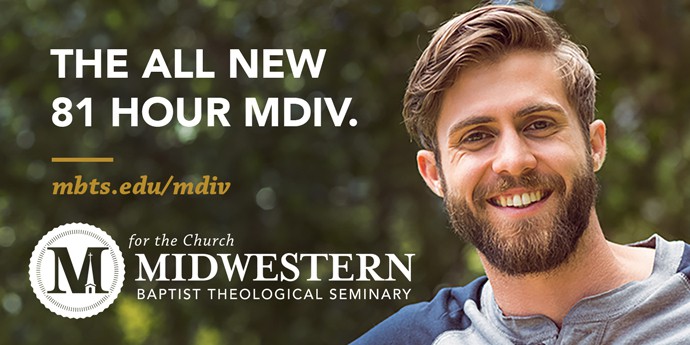This sponsored post is provided by Midwestern Baptist Theological Seminary.
If you’ve been in church ministry for any length of time, you’ve probably discovered that one of the persistent challenges of your role is the apparent need to treat it like ten roles. While nearly every pastor is exceptionally gifted in one particular area or another, it is rare that our ministry context allows us to camp out in that one area. As churches grow in scale, it may become more necessary for pastors to serve as specialists, but in most churches, the pastor as “general practitioner” is still the order of the day.
In some evangelical corners, the pastor as generalist may not seem like a particularly cool concept, or even a particularly efficient one, but it certainly has biblical precedent. We have, of course, the various qualifications listed (1 Timothy 3:1-7, Titus 1:5-9, and 1 Peter 5:1-4). These passages show us what every elder must be, but they shouldn’t be taken as a description of the ideal pastoral personality. Instead, they may show us, alongside the requisite gifting, the requisite pastoral persona—or personas, plural. For instance, in Paul’s letters, we learn that the pastor should be a faithful family man, a gracious host, a disciplined student, and a respected community member. Peter’s list adds the more general descriptor of shepherd. Both apostles of course emphasize that the pastor must be a faithful preacher of the word of truth.
But there’s more. In 1 Corinthians 9:19-23, Paul holds himself up as an example of pastoral versatility in reaching the lost for Christ. As our own cultural landscape continues to change, the faithful local church pastor will also find himself continually renewing his foundational commitment to the unchanging gospel of Jesus Christ while at the same time reevaluating his missional strategy for preaching and applying that gospel. Doing the work of an evangelist, Paul tells the young pastor in 2 Timothy 4:5, is one way to “fulfill your ministry.” In 1 Corinthians 9, then, he’s fleshing out what that might look like. It would seem that even in evangelism and mission, the pastor must “wear many hats.”
Of course, there is a fleshly way many pastors go about trying to “be all things to all people.” This is why the Mayo Clinic warns that those in “helping professions” are at high risk for burnout, because they “identify so strongly with their work that they lack a reasonable balance between work life and personal life and try to be everything to everyone.” Biblically speaking, we’d call this idolatry.
And yet, there is a healthy, God-honoring way for ministers to embrace the call to be “all things to all people.” We could call this more formally the inter-disciplinary work of pastoral ministry. Or we could call it being a renaissance man! A renaissance man is of course, a man of multiple talents. He accesses a wider breadth of knowledge. The pastoral renaissance man, then, is one who gives his whole self to the whole word that he may be of whole use to the whole church.
Not to be confused with a dilettante, who simply dabbles in this and that according to personal whim and cultural fancy, the pastoral renaissance man is a committed exegete, a prayerful missiologist, and a longsuffering shepherd. While the dilettante is outsourcing his study, the renaissance man is a theologian. While the dilettante is scouring the blogs for the latest church growth techniques, the renaissance man is having coffee with his lost neighbor. While the dilettante is delegating away messy ministry to focus more on “vision,” the renaissance man is feeding the sheep.
Pastoral ministry is not theoretical. It’s not even something you can halfway do.
The challenges of ministry are many and the bar is set high, but our capacities are limited and our reach is short.
How in the world can we pull all this off? Well, we can’t really. That’s one of the other lessons you learn from spending any length of time in ministry. None of us are Prophet, Priest, and King enough to “be Jesus” to our church and our neighborhood. The challenges of ministry are many and the bar is set high, but our capacities are limited and our reach is short..
All the more reason to lean into the fullness of Christ. Pursuit of him will improve our gifts, adoration of him will increase our holiness, and preaching of him will mitigate our weakness. It is a good to know as we fail constantly at “pastoral versatility” just how versatile the gospel of Jesus really is.
With this in mind, Midwestern Seminary has been laboring to meet the growing need for pastoral versatility. To this end, we have reevaluated and restructured our Master of Divinity (M.Div) degree to better equip church leaders for our rapidly changing ministry landscape. We’ve made the M.Div degree program leaner (81 hours), competitive in cost, and – with both residential and online options – more accessible than ever. M.Div students at Midwestern receive excellent equipping in courses like:
- Pastoral Care and Counseling taught by Midwestern Seminary President Jason Allen
- History of Christianity taught by Christian George
- Life and Ministry of Jonathan Edwards taught by Owen Strachan
- Principles of Leadership taught by Midwestern Seminary Vice President Charles Smith
- Cross-Cultural Communication taught by missiologist Robin Hadaway
Our M.Div program also offers multiple concentrations to suit your particular calling and context, including Preaching and Pastoral Ministry, Biblical Languages, Counseling, Church Planting, Leadership, Worship Ministries, and more.
We take our vision to be For The Church seriously, and it’s this vision that drives our commitment to training the next generation of ministers in the robust truth of the gospel. Get more details about the M.Div program and discover more about the fastest-growing seminary in North America at mbts.edu/mdiv.












